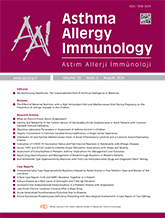


Objective: This study aims to assess the level of knowledge of doctors on anaphylaxis and its management at a tertiary care teaching hospital.
Materials and Methods: A pretested structured questionnaire was administered to the doctor, assistant doctor, and specialist doctor. Volunteers were asked to answer a questionnaire containing questions about anaphylaxis and its management. The questionnaire was administered face to face.
Results: Physicians from different branches of surgery and internal medicine participated in the study together with general practitioners, and the average age of 85 physicians participating in the study was 42.6 years. In the study, 8 of those participating were general practitioners, twenty six were medical residency students, and fifty one were working as specialist physicians in the tertiary hospital. The majority of the participants (83.5%) stated that they had encountered anaphylaxis before. There was no statistical difference between professional experience and the anaphylaxis encounter rate (p=0.76). Only 4 participants correctly answered the diagnostic criteria of anaphylaxis. While 85% of the participants marked the combination of skin and respiratory signs and symptoms for the diagnosis, only 15% marked the combination of cardiovascular and gastrointestinal system signs and symptoms for the diagnosis. Unfortunately twenty participants did not administer intramuscular (im) adrenaline as first-line therapy in the treatment of anaphylaxis. After anaphylactic shock, sixty nine participants stated that the patient should be kept under observation for 8 to 24 hours.
Conclusion: Knowledge regarding anaphylaxis and its management is a basic requirement that every health care provider must acquire for the appropriate treatment of all patients. We show that there was no statistical relationship between professional experience and the diagnosis and treatment of anaphylaxis. We think that it would be beneficial to provide physicians with in service training regarding the diagnosis and management of anaphylaxis.